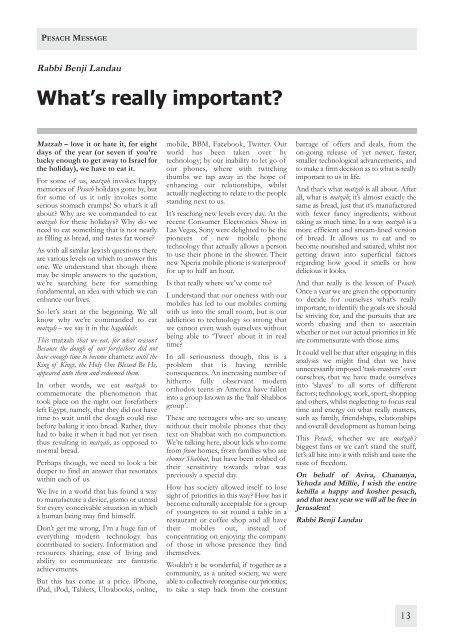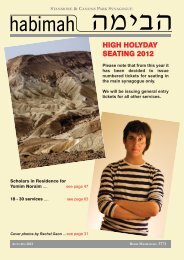STANMORE & CANONS PARK SYNAGOGUE - Stanmore and ...
STANMORE & CANONS PARK SYNAGOGUE - Stanmore and ...
STANMORE & CANONS PARK SYNAGOGUE - Stanmore and ...
You also want an ePaper? Increase the reach of your titles
YUMPU automatically turns print PDFs into web optimized ePapers that Google loves.
PESACH MESSAGE<br />
Rabbi Benji L<strong>and</strong>au<br />
What’s really important<br />
Matzah – love it or hate it, for eight<br />
days of the year (or seven if you’re<br />
lucky enough to get away to Israel for<br />
the holiday), we have to eat it.<br />
For some of us, matzah invokes happy<br />
memories of Pesach holidays gone by, but<br />
for some of us it only invokes some<br />
serious stomach cramps! So what’s it all<br />
about Why are we comm<strong>and</strong>ed to eat<br />
matzah for these holidays Why do we<br />
need to eat something that is not nearly<br />
as filling as bread, <strong>and</strong> tastes far worse<br />
As with all similar Jewish questions there<br />
are various levels on which to answer this<br />
one. We underst<strong>and</strong> that though there<br />
may be simple answers to the question,<br />
we’re searching here for something<br />
fundamental, an idea with which we can<br />
enhance our lives.<br />
So let’s start at the beginning. We all<br />
know why we’re comm<strong>and</strong>ed to eat<br />
matzah – we say it in the hagaddah:<br />
This matzah that we eat, for what reason<br />
Because the dough of our forefathers did not<br />
have enough time to become chametz until the<br />
King of Kings, the Holy One Blessed Be He,<br />
appeared unto them <strong>and</strong> redeemed them.<br />
In other words, we eat matzah to<br />
commemorate the phenomenon that<br />
took place on the night our forefathers<br />
left Egypt, namely, that they did not have<br />
time to wait until the dough could rise<br />
before baking it into bread. Rather, they<br />
had to bake it when it had not yet risen<br />
thus resulting in matzah, as opposed to<br />
normal bread.<br />
Perhaps though, we need to look a bit<br />
deeper to find an answer that resonates<br />
within each of us.<br />
We live in a world that has found a way<br />
to manufacture a device, gizmo or utensil<br />
for every conceivable situation in which<br />
a human being may find himself.<br />
Don’t get me wrong, I’m a huge fan of<br />
everything modern technology has<br />
contributed to society. Information <strong>and</strong><br />
resources sharing, ease of living <strong>and</strong><br />
ability to communicate are fantastic<br />
achievements.<br />
But this has come at a price. iPhone,<br />
iPad, iPod, Tablets, Ultrabooks, online,<br />
mobile, BBM, Facebook, Twitter. Our<br />
world has been taken over by<br />
technology; by our inability to let go of<br />
our phones, where with twitching<br />
thumbs we tap away in the hope of<br />
enhancing our relationships, whilst<br />
actually neglecting to relate to the people<br />
st<strong>and</strong>ing next to us.<br />
It’s reaching new levels every day. At the<br />
recent Consumer Electronics Show in<br />
Las Vegas, Sony were delighted to be the<br />
pioneers of new mobile phone<br />
technology that actually allows a person<br />
to use their phone in the shower. Their<br />
new Xperia mobile phone is waterproof<br />
for up to half an hour.<br />
Is that really where we’ve come to<br />
I underst<strong>and</strong> that our oneness with our<br />
mobiles has led to our mobiles coming<br />
with us into the small room, but is our<br />
addiction to technology so strong that<br />
we cannot even wash ourselves without<br />
being able to ‘Tweet’ about it in real<br />
time<br />
In all seriousness though, this is a<br />
problem that is having terrible<br />
consequences. An increasing number of<br />
hitherto fully observant modern<br />
orthodox teens in America have fallen<br />
into a group known as the ‘half Shabbos<br />
group’.<br />
These are teenagers who are so uneasy<br />
without their mobile phones that they<br />
text on Shabbat with no compunction.<br />
We’re talking here, about kids who come<br />
from frum homes, from families who are<br />
shomer Shabbat, but have been robbed of<br />
their sensitivity towards what was<br />
previously a special day.<br />
How has society allowed itself to lose<br />
sight of priorities in this way How has it<br />
become culturally acceptable for a group<br />
of youngsters to sit round a table in a<br />
restaurant or coffee shop <strong>and</strong> all have<br />
their mobiles out, instead of<br />
concentrating on enjoying the company<br />
of those in whose presence they find<br />
themselves.<br />
Wouldn’t it be wonderful, if together as a<br />
community, as a united society, we were<br />
able to collectively reorganise our priorities;<br />
to take a step back from the constant<br />
barrage of offers <strong>and</strong> deals, from the<br />
on-going release of yet newer, faster,<br />
smaller technological advancements, <strong>and</strong><br />
to make a firm decision as to what is really<br />
important to us in life.<br />
And that’s what matzah is all about. After<br />
all, what is matzah; it’s almost exactly the<br />
same as bread, just that it’s manufactured<br />
with fewer fancy ingredients; without<br />
taking as much time. In a way matzah is a<br />
more efficient <strong>and</strong> stream-lined version<br />
of bread. It allows us to eat <strong>and</strong> to<br />
become nourished <strong>and</strong> satiated, whilst not<br />
getting drawn into superficial factors<br />
regarding how good it smells or how<br />
delicious it looks.<br />
And that really is the lesson of Pesach.<br />
Once a year we are given the opportunity<br />
to decide for ourselves what’s really<br />
important; to identify the goals we should<br />
be striving for, <strong>and</strong> the pursuits that are<br />
worth chasing <strong>and</strong> then to ascertain<br />
whether or not our actual priorities in life<br />
are commensurate with those aims.<br />
It could well be that after engaging in this<br />
analysis we might find that we have<br />
unnecessarily imposed ‘task-masters’ over<br />
ourselves, that we have made ourselves<br />
into ‘slaves’ to all sorts of different<br />
factors; technology, work, sport, shopping<br />
<strong>and</strong> others, whilst neglecting to focus real<br />
time <strong>and</strong> energy on what really matters,<br />
such as family, friendships, relationships<br />
<strong>and</strong> overall development as human being.<br />
This Pesach, whether we are matzah’s<br />
biggest fans or we can’t st<strong>and</strong> the stuff,<br />
let’s all bite into it with relish <strong>and</strong> taste the<br />
taste of freedom.<br />
On behalf of Aviva, Chananya,<br />
Yehuda <strong>and</strong> Millie, I wish the entire<br />
kehilla a happy <strong>and</strong> kosher pesach,<br />
<strong>and</strong> that next year we will all be free in<br />
Jerusalem!<br />
Rabbi Benji L<strong>and</strong>au<br />
13





